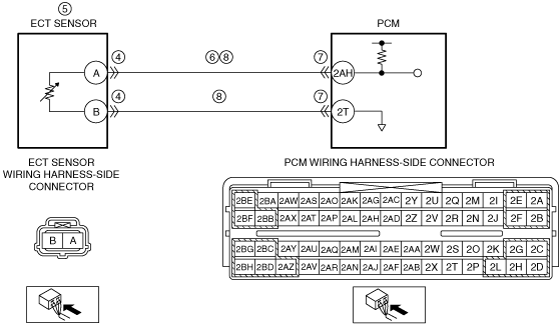|
1
|
VERIFY FREEZE FRAME DATA (MODE 2)/SNAPSHOT DATA AND DIAGNOSTIC MONITORING TEST RESULTS HAVE BEEN RECORDED
• Have the FREEZE FRAME DATA (Mode 2)/snapshot data and DIAGNOSTIC MONITORING TEST RESULTS (engine cooling system related) been recorded?
|
Yes
|
Go to the next step.
|
|
No
|
Record the FREEZE FRAME DATA (Mode 2)/snapshot data and DIAGNOSTIC MONITORING TEST RESULTS on the repair order, then go to the next step.
|
|
2
|
VERIFY RELATED SERVICE INFORMATION AVAILABILITY
• Verify related Service Information availability.
• Is any related Service Information available?
|
Yes
|
Perform repair or diagnosis according to the available Service Information.
• If the vehicle is not repaired, go to the next step.
|
|
No
|
Go to the next step.
|
|
3
|
VERIFY ENGINE CONDITION
• Verify the engine condition.
• Is the engine overheating?
|
Yes
|
Perform the symptom troubleshooting “NO.17 COOLING SYSTEM CONCERNS-OVERHEATING”.
|
|
No
|
Go to the next step.
|
|
4
|
INSPECT ECT SENSOR CONNECTOR CONDITION
• Switch the ignition to off.
• Disconnect the ECT sensor connector.
• Inspect for poor connection (such as damaged/pulled-out pins, corrosion).
• Is there any malfunction?
|
Yes
|
Repair or replace the terminal and/or connector, then go to Step 9.
|
|
No
|
Go to the next step.
|
|
5
|
CLASSIFY ECT SENSOR MALFUNCTION OR WIRING HARNESS MALFUNCTION
• Access the ECT PID using the M-MDS.
• Verify and compare the ECT PID values when disconnecting and connecting ECT sensor connector.
• Does the ECT PID value change?
|
Yes
|
Replace the ECT sensor, then go to Step 9.
|
|
No
|
Go to the next step.
|
|
6
|
INSPECT ECT SENSOR SIGNAL CIRCUIT FOR SHORT TO GROUND
• Switch the ignition to off.
• Disconnect the ECT sensor connector.
• Inspect for continuity between ECT sensor terminal A (wiring harness-side) and body ground.
• Is there continuity?
|
Yes
|
If the short to ground circuit could be detected:
• Repair or replace the wiring harness for a possible short to ground.
If the short to ground circuit could not be detected:
• Replace the PCM (short to ground in PCM internal circuit).
Go to Step 9.
|
|
No
|
Go to the next step.
|
|
7
|
INSPECT PCM CONNECTOR CONDITION
• Disconnect the PCM connector.
• Inspect for poor connection (such as damaged/pulled-out pins, corrosion).
• Is there any malfunction?
|
Yes
|
Repair or replace the terminal and/or connector, then go to Step 9.
|
|
No
|
Go to the next step.
|
|
8
|
INSPECT ECT SENSOR SIGNAL CIRCUIT AND GROUND CIRCUIT FOR SHORT TO EACH OTHER
• ECT sensor and PCM connectors are disconnected.
• Inspect for continuity between ECT sensor terminals A and B (wiring harness-side).
• Is there continuity?
|
Yes
|
Repair or replace the wiring harness for a possible short to each other, then go to the next step.
|
|
No
|
Go to the next step.
|
|
9
|
VERIFY DTC TROUBLESHOOTING COMPLETED
• Make sure to reconnect all disconnected connectors.
• Clear the DTC from the PCM memory using the M-MDS.
• Perform the KOEO or KOER self test.
• Is the same DTC present?
|
Yes
|
Repeat the inspection from Step 1.
• If the malfunction recurs, replace the PCM.
Go to the next step.
|
|
No
|
Go to the next step.
|
|
10
|
VERIFY AFTER REPAIR PROCEDURE
• Perform the “AFTER REPAIR PROCEDURE”.
• Are any DTCs present?
|
Yes
|
Go to the applicable DTC inspection.
|
|
No
|
DTC troubleshooting completed.
|
